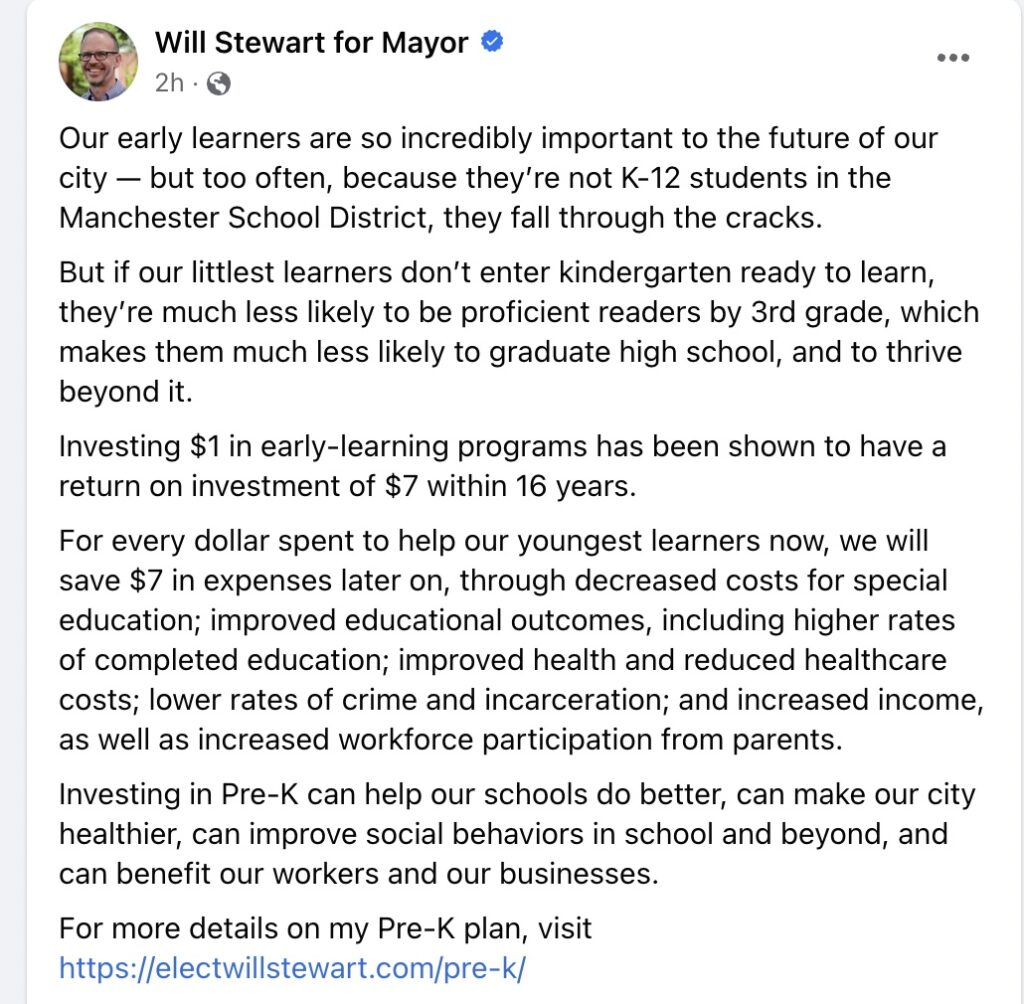Most politicians are clueless when it comes to education policies and research. Will Stewart, Democrat candidate for Mayor in Manchester, proved that with a recent post on his Facebook page. Will Stewart is beating the drums to get kids into pre-school. He cites getting children ready to learn in Kindergarten so they can be reading by 3rd grade.
Most politicians have no idea what they are talking about when it comes to teaching children how to read. He has no idea that pushing children to perform academically before they are cognitively ready can have a negative impact on young children.
Pre-school should be fun, but there is no need for children to go to pre-school. In fact, experts are telling parents the opposite of what Stewart is selling.
In an article in the Atlantic titled: The New Preschool Is Crushing Kids, they are saying, “Today’s young children are working more, but they’re learning less.” They go on to say:
A child who’s supposed to read by the end of kindergarten had better be getting ready in preschool. As a result, expectations that may arguably have been reasonable for 5- and 6-year-olds, such as being able to sit at a desk and complete a task using pencil and paper, are now directed at even younger children, who lack the motor skills and attention span to be successful.
They wisely point out that this attitude towards early childhood education is harming children, not helping them.
Much of this began after the release of the Common Core Standards. If Stewart actually read them, he would have noticed that the early childhood standards are developmentally inappropriate for young children.
A Joint Statement of Early Childhood Health and Education Professionals on the Common Core Standards Initiative
was issued by the Alliance for Childhood. www.allianceforchildhood.org In the document they raised “GRAVE CONCERNS” about the Common Core Standards for young children. They warned:
The draft standards made public in January conflict with compelling
new research in cognitive science, neuroscience, child development, and early childhood
education about how young children learn, what they need to learn, and how best to teach them
in kindergarten and the early grades.And
There is little evidence that such standards for young children lead to later success. While an introduction to books in early childhood is vital, research on the links between the intensive teaching of discrete reading skills in kindergarten and later success is inconclusive at best.
Many of the countries with top-performing high-school students do not begin formal schooling until age six or seven.
There is science to back this up. Stanford researchers say we are sending children to school way too early.
A new study from Stanford University shows that Danish kids who postponed kindergarten for up to one year showed dramatically higher levels of self-control.
“We found that delaying kindergarten for one year reduced inattention and hyperactivity by 73% for an average child at age 11,” Thomas Dee, one of the co-authors and a Stanford Graduate School of Education professor, said in a release.
All of this was reported here.
Stewart isn’t taking into account any of the research that has been done on Common Core and its impact on young children. He hasn’t taken into account how children succeed in foreign countries when delaying the start of formal education.
If he really cares about children being able to read, then he should pay close attention to the reading programs used in our public schools. Many students are not receiving quality reading instruction. That’s where he should focus if he wants our kids to become good readers. Stewart’s vision includes policies and spending on programs that have been proven to harm children instead of helping them.

